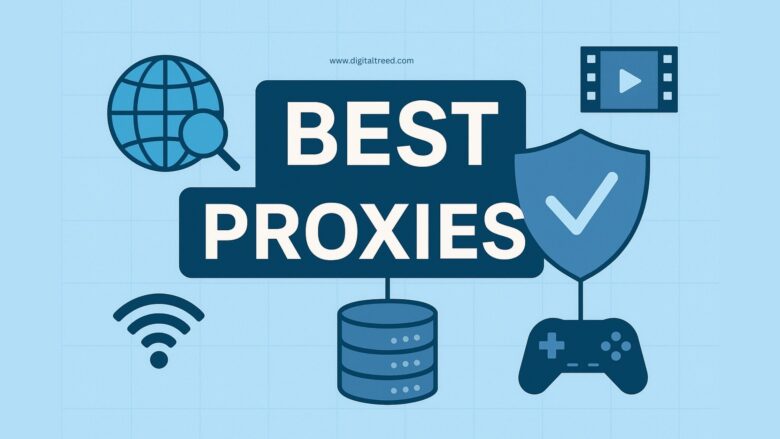Today, your online life — from gaming to shopping — needs a connection that is fast, safe, and built just for you. The type of proxy you pick can speed up your game, protect your financial information, or let you stream in HD. Acting like a middle relay, these tools hide your real IP and redirect traffic along a chosen path. By the end of this post, you will know which proxy fits each job, helping you browse calmly, stream smoothly, and work privately.
Why Proxies Matter for Your Online Experience
Proxies lift several heavy burdens off your online footprint, starting with keeping your name and location private. When you surf behind one, curious sites and hackers see its IP number instead of yours, so your real trail stays hidden. That same mask also breaks stubborn regional blocks, letting you stream worldwide programs as if you lived there.
On top of that, plenty of proxies cache page data. So the next time you load something while using them, the content pops up almost instantly, saving seconds on every request.
Types of Proxies and Their Uses
Every kind of proxy has its own job, and picking the right one makes your online work smoother. Check out the main types to see which fits you best:
1. Datacenter: Fast and cheap, these come from data center servers and shine in heavy-duty tasks like web scraping or running several accounts at once. Because they are not tied to real homes, some security systems may see them as less trustworthy.
2. Static: These give you a steady IP that belongs to a home network, which builds trust with sites for sensitive jobs such as e-commerce audits or ad-checking. Their IP does not hop around, so you avoid the trouble of a new address every few minutes.
3. Rotating: They constantly swap their address. This type keeps you incognito during massive scraping runs or when trying to get into geo-blocked pages.
4. Mobile: Routed through cellphone networks, these mimic real phone traffic and work wonders for social media campaigns or when loading mobile-only content. Using them reduces the chances of getting banned significantly.
Matching Proxies to Your Online Activities
Picking the right proxy depends on what you do online. It may include:
1. Streaming and Bypassing Geo-Restricted Content: Employ static residential proxies for uninterrupted access to streaming services. With them, you bypass area restrictions, and at the same time, you have stable connections that are ideal for continuous viewing.
2. Web Scraping: Use rotating proxies to accomplish bigger data collection tasks. When you cycle IPs, you can avoid rate limits and bans.
3. Gaming: Go for datacenter proxies for low-latency connections. In addition to reducing lag, you also improve response times, which are very important for fast-paced games.
4. E-Commerce and Sneaker Copping: Static residential proxies allow you to stay in front, securing limited-edition items. Since they make websites see you as a legitimate user, they increase your chances of avoiding purchase restrictions.
5. Social Media Management: Mobile proxies shine for running multiple accounts safely. Because they broadcast IPs tied to actual phones, you avoid red flags and manage profiles with less hassle.
Factors to Consider When Choosing a Proxy
Your choice of proxy really depends on a few big, practical things. Among those are:
1. Speed: Pick a low-latency proxy if you’re gaming or binge-watching. Slow connections can be annoying due to buffering and introducing lag into your online gaming experience, both things you want to avoid.
2. Security: Make sure the proxy uses strong encryption, like HTTPS. That way, your online purchases and private info stay locked up against hackers.
3. Anonymity Level: High-anonymity proxies wipe your digital fingerprint, perfect for private jobs. You stay hidden from sites and trackers and keep your personal life out of view.
4. Geographic Coverage: Go with a provider that has available locations exactly where you need them.
5. Reliability: Look for uptime promises in the 99% range. Better odds mean fewer dropouts while you’re in the middle of something that counts.
Setting Up Your Proxy Connection
Once you choose your proxy, setup is done with just a few simple steps. Generally, providers give a detailed guide for a quick setup on a variety of browsers, apps, and devices. Just put the IP and port number in your settings and then log in with your credentials. Using proxy management software, your IPs will rotate automatically, making it less complicated for tasks like scraping.
To get the most out of your proxy, track its performance regularly to find out if there are any slowdowns or gaps in the service. In addition, set changes in IPs at the right time to get the best out of your scraping activities.
Conclusion
Finding an appropriate proxy is a great step in your online journey because it is going to give you speed, security, and access — the three pillars of true online freedom. Choosing the right one will empower you to navigate the digital world seamlessly and without obstacles.

Leave a Reply